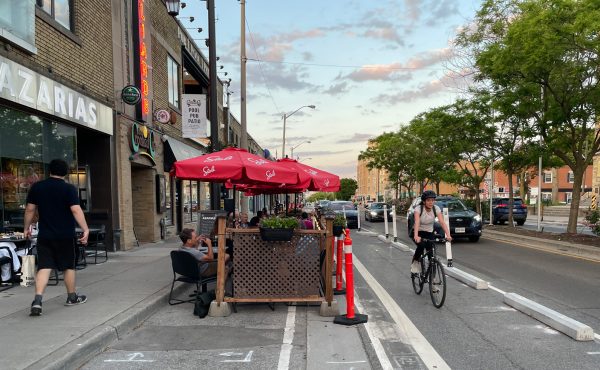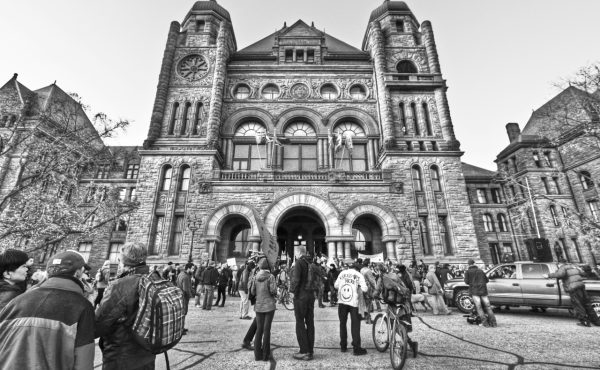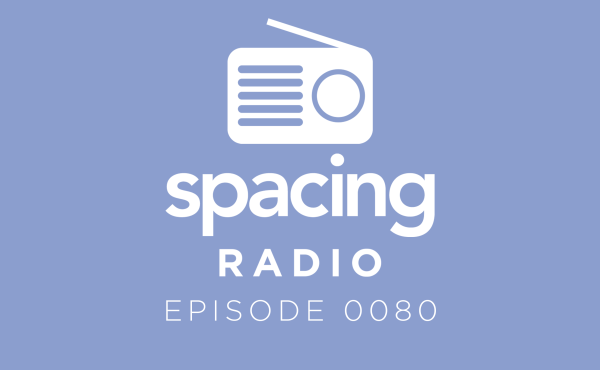

When Glen Murray asked me to be his Facebook friend last spring, I reckoned his overtures weren’t merely about putting down roots in Toronto’s impervious social soil. Indeed, his status updates in recent weeks have read like the musings of a man in the midst of what other would-be politicians describe as a “listening tour.”
With Murray poised to announce his candidacy for mayor this week, the progressive end of the political spectrum will have its first official post-David Miller standard-bearer — a position confirmed with the rather precipitous decline of George Smitherman’s chances in the post-eHealth audit era. (Listen to this week’s Spacing Radio podcast for an interview with Murray)
Murray’s resume, for those not familiar with it: he was Winnipeg’s mayor for six years, until he resigned in 2004 to run as a star candidate for Paul Martin’s Liberals (he lost). In office, he cut property taxes, shilled for a “new deal” for cities, and served as the first out-gay man to be mayor of a large Canadian city.
Since 2004, he’s been in Toronto, doing this and that — stints with Massey College, the consulting firm Navigator, a national environmental task force, and, heading up the Canadian Urban Institute, which is more of a consulting outfit than its name might suggest.
Murray’s much-hyped new deal, promoted with Jane Jacobs through the so-called C-5 mayor’s summit, proposed radically shifting the tax burden off municipal property owners by introducing city sales taxes, securing additional government transfers and increasing user fees; conceptual elements of his plan resurfaced in Stephane Dion’s ill-fated carbon tax proposal. Murray, however, failed to get his far-ranging strategy adopted, and we all know what happened to Dion.
A few weeks back, he described himself as a fiscal conservative/social progressive (who isn’t?). A legendary motor-mouth, he has long positioned himself as an urban ideas man about town. So I wouldn’t be surprised if Murray came out of the gate with an updated Toronto version of that new deal vision — tax shifting, lower property taxes, etc. — based on experiences from his days in Winnipeg.
Approach with caution: For one thing, Winnipeg’s budget is very different than Toronto’s, and not just in scale. When Murray came into office in the late 1990s, the city’s revenues were a complete mess, due partly to ruinous property taxes — you know, the sort that drive out people and businesses and kill the core.
On the face of it, he did succeed in cutting property taxes and diversifying the tax base somewhat. He built public spaces and cultivated the arts. But the fiscal reality is that the City of Winnipeg doesn’t have a major transit system to subsidize, whereas it spends lavishly on snow removal. The downtown is still heavily blighted, and inner city aboriginal poverty remains an unyielding social crisis. Comparing our municipal pressures to theirs is anything but an apples-to-apples exercise.
The reality is that an electoral storyline about tax shifting isn’t going to sell in Toronto in 2010. John Tory would have to be a fool not to rekindle voter anger over Miller’s land transfer and vehicle registration levies. What’s Murray going to say in response? Let’s have more non-traditional “revenues”? I don’t think so.
As I argued here last week, Miller’s looming departure is a kind of requiem for the new deal for cities. With the political trade winds blowing rightward, the main centre-left candidate — be it Murray or a council insider like Shelley Carroll – will have to find a new way to argue the big point David Miller’s tried to make for years: that a big city’s responsibilities are unique, and won’t be solved on the cheap.
Oh yes, and it’s not just about accounting.




8 comments
John,
How can you say that Mayor Miller has been making the argument that Toronto can’t be successful on the cheap?
That is exactly what he, and the entire council, has been doing. Draining the reserve funds to cover operational shortfalls is exactly that. It is a way of providing more services for less money than would other wise be necessary.
It would also help if the city would convey the true cost of services to residents. We see this chart in many city documents……….
http://www.toronto.ca/civic-engagement/learning-material/images/finances4-lg.jpg
Most people, reading that, would assume that the dollar figures listed represent the average per household cost. They do not! Property taxes represent only 39% of city revenue. To derive a more accurate approximation of per household cost for the listed services you must divide the figures by .39.
recalculated figures for some non down loaded expenses…..
Fire $ 1,494.25
TTC $ 659.43
Fire $ 622.46
Parks $ 429.31
Debt $ 339.46
Trans. $ 319.10
Library$ 282.33
as you can see, the city provides much in the way of services for far less than its collects from residents. Yet on the left we have council saying the others should pay and the right saying no one should pay.
Fire them all!
I hope he does run for Mayor, if only to see how the electorate reacts to his new deal ideas.
Murray was a honoured guest and panelist at the Ontario Heritage Conference in Peterborough this year (along with Adam Vaughan).
He seemed like a skilled politician to me.
He is fairly adept at framing tax incentives that benefit green development and the adaptive reuse of heritage buildings as a small part of a larger toolkit for sustainable growth. He has a lot of good ideas, diverse experience, and is able to balance conversations in a way that clearly emphasizes the benefits to all involved, from varied perspectives.
Should go over well in Toronto.
What is it exactly that makes him “progressive” or “centre-left”? (Serious question, not snark, as I just don’t know much about Murray). Most of his record you describe consists of cutting taxes, and I don’t see any new major transit initiatives or other social programs in his past at all.
J.M.,
He did manage to make some improvements to downtown Wpg. He managed to secure federal/provincial funding for an LRT but I gather his successor iced the plan in favour of more parks, etc. Re: social stuff — Winnipeg is deeply enmeshed in a fed-prov effort to improve the lot of inner-city aboriginals, and I think he was involved with that — links to Axworthy, etc.
If only the city of Toronto would spend lavishly on snow removal, not least on bike lanes/trails and dense residential twoway streetgrids such as in East York which become de facto one-way in January-March because the snowploughs only run down the centre of the road.
OK, thanks. That’s interesting about the LRT; I didn’t know there’d been one planned in Winnipeg.
Yes, John. It does sound a bit like you’re blaming Murray for stuff that has or hasn’t happened after he left, that he may or may not have had a hand in. Murray has made it clear that he’s interested in hearing what we think as opposed to strictly spouting out ideas based on “current” research. I look forward to a refreshing point of view about TO’s old problems.
Thanks for this space.
Yes, John. It does sound a bit like you’re blaming Murray for stuff that has or hasn’t happened after he left, that he may or may not have had a hand in. Murray has made it clear that he’s interested in hearing what we think as opposed to strictly spouting out ideas based on “current” research. I look forward to a refreshing point of view about TO’s old problems.